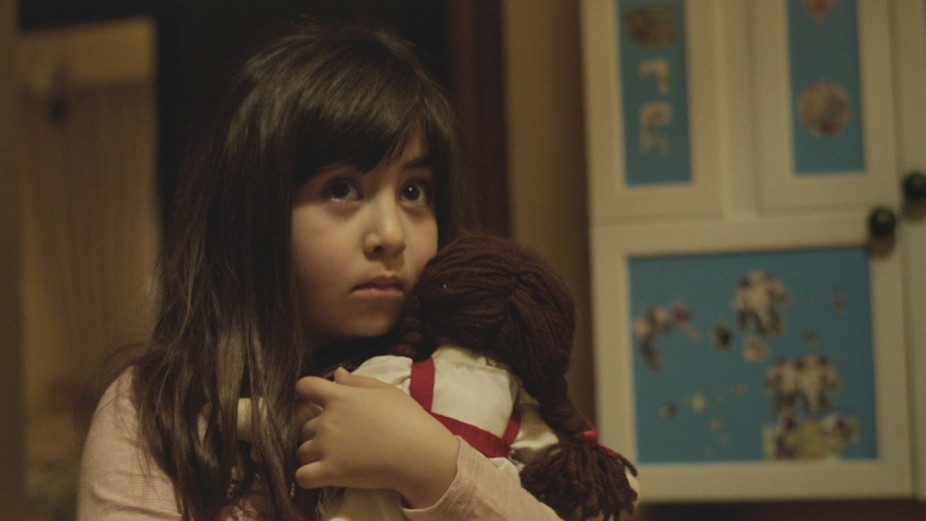Under the Shadow, a horror set in 1988 Tehran and Iranian director Babak Anvari’s first feature, took Sundance by storm. Out this week, it is not only one of the best horror films this year but also the newest feminist reading of the genre.
The film takes place predominantly indoors in a Tehran flat. A young couple are trying to continue their normal lives with their six-year-old daughter, in the midst of the war between Iran and Iraq. Yet, the war is not the only horror they will have to deal with. We slowly discover that the family – or rather the mother and her daughter – are also under attack from mysterious forces.
Under the Shadow grounds you in reality even as it deals with the supernatural powers that soon haunt and suffocate the mother, Shideh (Narges Rashidi), and her daughter, Dorsa (played by the impressive young actress Avin Manshadi). The film does not hurry with the horror, taking time to develop its characters, slowly introducing them and the context in which they live, including the neighbours. This gives us glimpses of various lives and lifestyles in post-revolutionary Tehran.
We find out early on that Shideh wants to go back to her medical studies but much to her frustration is unable to due to her political activism before the revolution. In one lengthy scene, she desperately tries to convince the male authority figure to give her another chance, yet the man tells her she will never be readmitted. Back home, seeing how upset she is, her neighbour tells her “not to let them change her”. But how one remains unchanged, and how to keep “them” outside, is the question Anvari seems to be asking with the rest of the film.
Shideh’s desire to become a medical doctor, along with other details of her life, all work together to establish that she is constantly maintaining (like many) two lives, one in the outside world and one on the inside. And this distinction leads to increasing suffocation and invasion of her interior (life) as the outside slowly creeps in. Things start disappearing – as well as appearing – as a vicious djinn comes out to play, or rather mess, with her.
Tackling sexism with terror
Although Anvari’s film is about Iran and entirely in Farsi, it was not shot there in order to bypass censorship. The country has strict regulations in film-making, particularly regarding the representation of women. Some Iranian regulations make it very difficult for filmmakers to capture interior life realistically, and to construct fully developed characters. It would have been impossible, for instance, for Shideh to expose her hair and wear gym clothing at home while she exercises.

More to it than losing the veil. Under the Shadow
Under the Shadow appears to critique Iran and its preoccupation with women’s bodies, yet it does not stop at criticising the imposed veil. Shideh’s husband, for example, is an educated man (a doctor) and appears to be supportive of his wife’s decision to go back to medical school. Yet in one argument he reveals that he really thinks that Shideh is chasing a dream at the expense of her other (motherly) responsibilities.
I know of no woman who won’t relate to this “educated” and “nuanced” form of sexism and it is refreshing that Anvari’s film is prepared to acknowledge it, rather than resorting to easy criticism of Iran only. Anvari seems to be aware that the male privilege is part of what makes such oppression function smoothly, which is undoubtedly not specific to Iran. In a context where how much women cover and uncover is predominantly determined and justified by men (and sometimes policed at gun point) this is also a film about male privilege, about regulating women’s bodies, and the horrors that come with it.
Except for a few – easily forgivable – near cliché moments, Under the Shadow will not disappoint horror fans. But given its wider and all too of the moment concerns, it deserves your attention whoever you are.
 Ozlem Koksal does not work for, consult, own shares in or receive funding from any company or organisation that would benefit from this article, and has disclosed no relevant affiliations beyond the academic appointment above.
Ozlem Koksal does not work for, consult, own shares in or receive funding from any company or organisation that would benefit from this article, and has disclosed no relevant affiliations beyond the academic appointment above.
This article was originally published on The Conversation. Read the original article.




 Paramount Skydance Eyes Streamlined Merger with Warner Bros Discovery Amid $60 Billion Offer Rejection
Paramount Skydance Eyes Streamlined Merger with Warner Bros Discovery Amid $60 Billion Offer Rejection  The Mona Lisa is a vampire
The Mona Lisa is a vampire  Trump to Pardon Reality Stars Todd and Julie Chrisley After Tax Fraud Conviction
Trump to Pardon Reality Stars Todd and Julie Chrisley After Tax Fraud Conviction  Disney Investors Demand Records Over Jimmy Kimmel Suspension Controversy
Disney Investors Demand Records Over Jimmy Kimmel Suspension Controversy  Netflix Shuts Down Boss Fight Entertainment, Developer of “Squid Game: Unleashed” Amid Gaming Strategy Shift
Netflix Shuts Down Boss Fight Entertainment, Developer of “Squid Game: Unleashed” Amid Gaming Strategy Shift  Trump Slams Super Bowl Halftime Show Featuring Bad Bunny
Trump Slams Super Bowl Halftime Show Featuring Bad Bunny  How Marvel’s Fantastic Four discovered the human in the superhuman
How Marvel’s Fantastic Four discovered the human in the superhuman  Trump–Kushner Links Raise Concerns as Paramount Pushes $108B Warner Bros Discovery Bid
Trump–Kushner Links Raise Concerns as Paramount Pushes $108B Warner Bros Discovery Bid  6 simple questions to tell if a ‘finfluencer’ is more flash than cash
6 simple questions to tell if a ‘finfluencer’ is more flash than cash  Jazz Ensemble Cancels Kennedy Center New Year’s Eve Shows After Trump Renaming Sparks Backlash
Jazz Ensemble Cancels Kennedy Center New Year’s Eve Shows After Trump Renaming Sparks Backlash  Paramount’s $108.4B Hostile Bid for Warner Bros Discovery Signals Major Shift in Hollywood
Paramount’s $108.4B Hostile Bid for Warner Bros Discovery Signals Major Shift in Hollywood  Trump Threatens Legal Action Against Disney’s ABC Over Jimmy Kimmel’s Return
Trump Threatens Legal Action Against Disney’s ABC Over Jimmy Kimmel’s Return  Google and NBCUniversal Strike Multi-Year Deal to Keep NBC Shows on YouTube TV
Google and NBCUniversal Strike Multi-Year Deal to Keep NBC Shows on YouTube TV  Some ‘Star Wars’ stories have already become reality
Some ‘Star Wars’ stories have already become reality  Trump Faces Mixed Reception at Kennedy Center Amid Conservative Overhaul
Trump Faces Mixed Reception at Kennedy Center Amid Conservative Overhaul 
































